A NIGHT OF HIGH ANTICIPATION
MET BY DISAPPOINTMENT
The arrival of dramatic soprano Lise Davidsen on the West Coast was nothing short of a highly anticipated musical event. Davidsen, reminiscent of the iconic Wagnerian opera singers of bygone eras, stands at an imposing 6 feet 2 inches, hailing from Norway, and possesses a voice so powerful that it could plausibly shatter windows. Her meteoric rise to fame and the cult-like following she has amassed can be attributed to her commanding performances in dramatic soprano roles, most notably gracing the stages of the prestigious Metropolitan Opera.
Davidsen’s forte, pun fully intended, lies in her ability to command a full orchestra within the vast expanse of grand concert halls. However, last night’s recital presented a unique challenge as she intermittently struggled to modulate her nuclear-powered voice for a program accompanied solely by a piano in the intimate confines of the 499-seat BroadStage in Santa Monica.
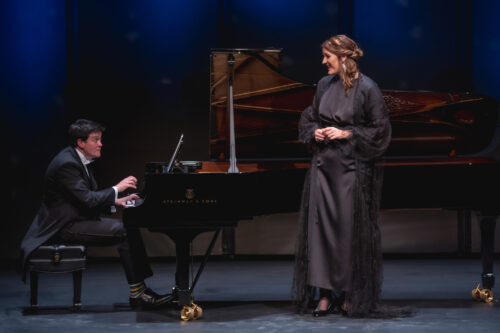
Assisting her on the piano was James Baillieu, a young, over-caffeinated South African pianist who brought a flair for dramatics both to his playing and his highly expressive facial expressions throughout the recital.
Lise began her program with a set of three songs by Edvard Grieg, performed in her native Norwegian. Her genuine affinity for singing in her mother tongue was evident. While these songs may have been unfamiliar to most American audiences, English supertitles projected above the stage bridged the linguistic gap, revealing Grieg’s innate gift for setting poems and his rightful place among the great lieder composers alongside Schubert and Schumann. In settings of poems by Otto Benzon, Davidsen masterfully conveyed the dangerous sexual allure of “Der gynger en båd på bølge” (“There’s a boat rocking on the waves”), while in “Drømme” (“Dreams”), she portrayed the illusion of love shattered by reality. While her dramatic interpretation was impeccable, her vocal modulation fluctuated between extremely loud and slightly less loud, revealing an inability to achieve the nuanced pianissimo required in a smaller venue.
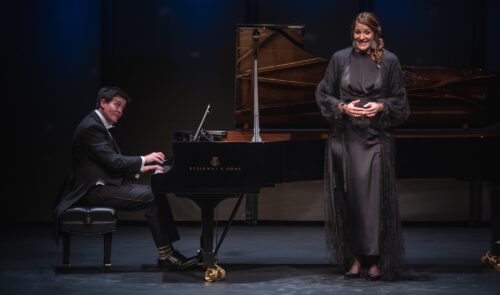
Transitioning from Grieg, Davidsen delved into three Swedish language songs by Sibelius, each deeply dramatic and exploring themes of sorrow, lost love, and death. These compositions received the full dramatic treatment from Davidsen, though subtlety was conspicuously absent, both in her delivery and in Bailieu’s overly bombastic interpretations.
The program continued with three Italian opera arias, one by Puccini and two by Verdi, showcasing Davidsen’s capacity for tackling dramatic, high-octave roles. Unfortunately, her tonal richness, perfectly suited for Wagner and Strauss, felt somewhat out of place in the realm of Italianate opera. Davidsen also displayed a tendency to distort vowels and obscure consonants, particularly in Italian, a language she clearly has not mastered.
Davidsen concluded the first half of her recital with Wagner’s “Dich Teure Halle” (from Tannhäuser), one of her signature pieces. Here, the sheer magnitude of her voice worked to her advantage, as her spirited rendition, coupled with outstretched arms, seemed to embrace the incredibly enthusiastic audience along with her resounding sound.
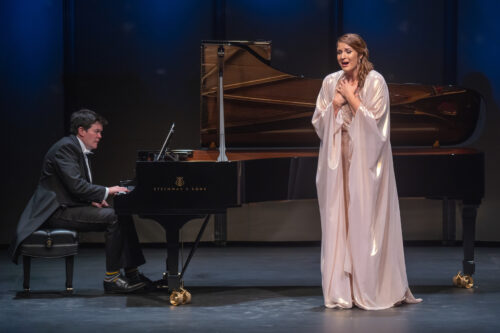
The second half commenced with “Pace, pace mio Dio” from Verdi’s La Forza Del Destino, a role she is set to tackle at the Met this season. Davidsen’s performance exuded beautiful sounds, though she sang as if her tongue had been surgically removed, emphasizing vowels while neglecting consonants.
Davidsen candidly shared with the audience that she had initially believed Schubert was not intended for dramatic sopranos. Her interpretation of three Schubert lieder unfortunately confirmed her previous stance. Schubert’s lieder were originally crafted for intimate salon settings, meant to be delivered by singers who could capture their inherent intimacy and simplicity. Regrettably, Davidsen struggled to convey the required intimacy, despite her evident fluency in German.
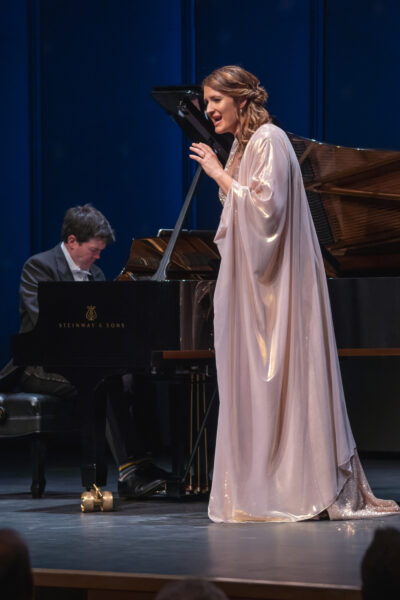
In the strophic song “An die Musik,” Davidsen offered little variation between verses, presenting a beautiful yet monotonous sound. In “Erlkönig,” Schubert’s masterful polyvocal micro-drama and a personal favorite, her rendition lacked differentiation between the characters of the father, the terrified child, and the menacing demon. Furthermore, Mr. Bailieu’s self-indulgent, bombastic piano playing did little to enhance the overall presentation.
Concluding the program, Davidsen performed “Heia Heia” from Kálmán’s operetta Die Csárdásfürstin while engaging the audience to clap along—shtick borrowed from Anna Netrebko’s recitals. She then offered a rendition of “I Could Have Danced All Night” from My Fair Lady, a nod to the great Birgit Nilsson who used to conclude her recitals with this piece. Unfortunately, Davidsen’s rendition felt rushed, with slurred lyrics and peculiar phrasing. Here’s hoping that Ms. Davidsen stays as far as possible from Broadway and the Great American songbook.
Davidsen’s encores included a respectable rendition of “Vissi D’arte” and the hauntingly beautiful yet melancholic “Varen” by Grieg.
While Lise Davidsen undeniably possesses remarkable talent, her true brilliance shines brightest in the grand operatic productions of Wagner and Strauss, within the expansive confines of large opera houses. Her recital career, as demonstrated last night, remains very much a work in progress.
photos by Ben Gibbs
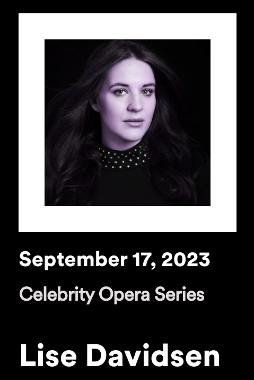

{ 2 comments… read them below or add one }
Thanks for the astute review.
The Broad Stage is far smaller than the auditorium of the Met so the necessity of scaling down is crucial.
Her Italian is all of the appliqué variety and if she were smarter — she’d stop and listen and learn a couple years before proceeding in that direction much further. The bright metallic timbre coupled with unintentional harshness and the increasingly uneven scale just does not work, either. And let’s hope this Floria Tosca stays in Norway as a beloved national exemplar of doing it THEIR way.
There is a continuing ingenue quality to her persona and stage presentation that by now — at age nearly 37 — is becoming tired and tiresome. Très vieux jeu. It’s time to grow up and face the music.
Camille, your words are pure GOLD. (Hopefully you get the musical theater reference.)